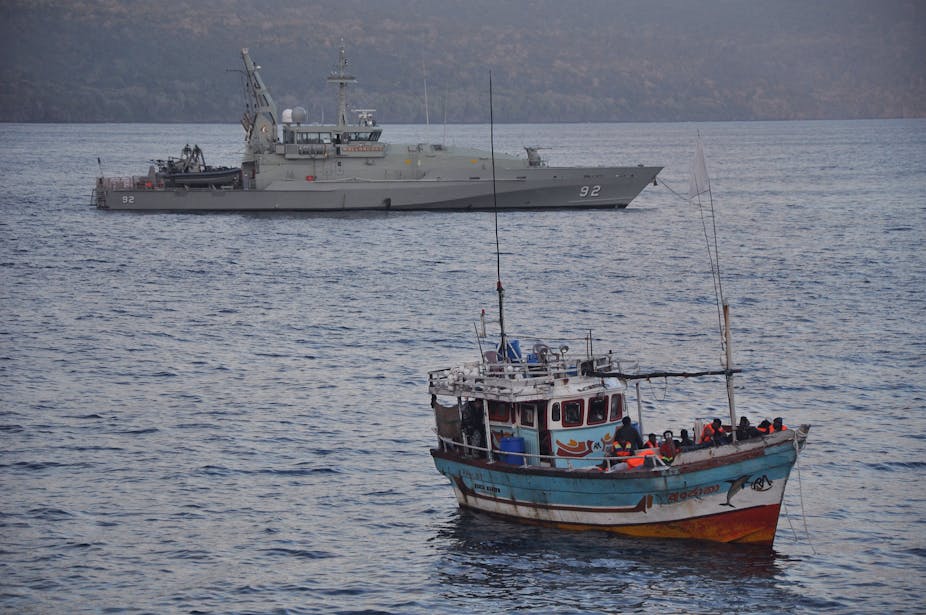Australia appears to have reached a new all-time low in its violation of international obligations and its treatment of vulnerable people seeking Australia’s protection. If widespread media reports are true, Australia is preparing to hand over to the Sri Lankan Navy a group of Tamil asylum seekers who fled Sri Lanka. The group reportedly includes 37 children and may include refugees and people at risk of torture.
The facts are sketchy and it is very difficult to work out the truth. The Australian government refuses to comment on “on-water operational matters”. There have been contradictory statements from Sri Lankan officials.
Screening processes
It has been reported that Australia conducted rudimentary screening of the asylum seekers via teleconference to determine if they are refugees or at risk of torture. It is believed that Australia asked asylum seekers their “name, country of origin, where they had come from and why they had left”.
However, such screening is insufficient. It cannot adequately identify people whose life is in danger or who may need protection from torture and persecution.
People are often sick, confused and overwhelmed at sea. They are unlikely to be in a position to articulate their need for protection. They may also be unaware of their rights or understand why they are being asked the questions they are being asked.
Importantly, a teleconference requires a person who may have been persecuted or even tortured by government officials in the past to speak about their fears to a government official they cannot see, do not know and may not trust. There is little privacy on board sea vessels and there is no way of knowing if others on board the vessel will report what one is saying to the government one is fleeing.
It is for these reasons that the United Nations High Commissioner for Refugees has previously called for the screening of asylum seekers intercepted at sea to be done on land.
Possible international law breaches
If Australia is in fact handing over Tamil refugees to the Sri Lankan government, the law being violated by Australia is very clear. Article 33 (1) of the UN Refugee Convention states:
No Contracting State shall expel or return (refouler) a refugee in any manner whatsoever to the frontiers of territories where his life or freedom would be threatened on account of his race, religion, nationality, membership of a particular social group or political opinion.
Article 33 (1) is arguably the most important provision in the Refugee Convention. The convention was adopted in part to ensure that the international community would never again turn its back on people fleeing persecution. Many nations were committed to prevent the recurrence of what happened to Jewish refugees who were handed back to their persecutors during some of the darkest periods in Europe’s history.
Australia voluntarily signed on to the Refugee Convention and therefore has willingly adopted a legal obligation to refrain from returning refugees to harm. Many people of Tamil ethnicity may have a well-founded fear of being persecuted in Sri Lanka. Handing refugees back to their persecutors is a violation of this obligation.
Australia is also a party to the UN Convention Against Torture, which clearly states in Article 3(1) that:
No State Party shall expel, return (“refouler”) or extradite a person to another State where there are substantial grounds for believing that he would be in danger of being subjected to torture.

Given the continuing allegations of the torture of Tamils in Sri Lanka, Australia may be in violation of its obligation to protect at least some of the asylum seekers from torture.
The asylum seekers being handed over to the Sri Lankan government may have travelled to Australia via India. This does not in any way diminish Australia’s obligations to any of the asylum seekers who are refugees.
Australia became legally responsible to protect refugees from being returned to Sri Lanka the moment it intercepted them and transferred them to Australian vessels. India is not a signatory to the Refugee Convention and refugees are not granted protection in India.
Reports that the asylum seekers may have had a satellite phone also does not diminish Australia’s responsibility for the people intercepted. Australia’s legal obligation is to anyone it exercises power or control over who is at risk of torture or fears being persecuted because of their race, religion, nationality, membership of a group or political opinion.
What possessions refugees or people at risk of torture have or do not have is irrelevant to Australia’s obligations to them.
Both Labor and Coalition governments in recent times have attempted to justify their harsh asylum policies on the grounds that they save lives. This argument no longer holds when Australia places the lives of Tamil asylum seekers at risk by directly handing them over to a government they claim to be fleeing without first adequately assessing their safety.

